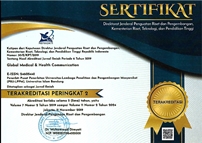Pemanfaatan Kalender 4M Sebagai Alat Bantu Meningkatkan Peran Serta Masyarakat dalam Pemberantasan dan Pencegahan Demam Berdarah
Abstract
Upaya pemberantasan sarang nyamuk yang dikenal selama ini adalah gerakan 3M, yaitu Menguras-Menutup-Mengubur. Program ini belum berjalan dengan optimal terbukti dengan masih tingginya insidensi DBD dan masih terjadi kejadian luar biasa. Dibutuhkan monitoring yang kuat untuk mencapai keberhasilan 3M. Penelitian ini bertujuan mempergunakan alat bantu berupa kalender 4M (Menguras-Menutup-Mengubur-Monitor) untuk dipergunakan sebagai alat monitoring dalam program pemberantasan sarang nyamuk. Penelitian ini merupakan penelitian kualitatif dengan metode studi kasus menggunakan teknik wawancara mendalam dan diskusi grup terfokus. Metode sampling yang digunakan adalah maximal variation sampling dengan teknik analisis triangulasi. Informan berasal dari Dinas Kesehatan Kota Bandung, Puskesmas Tamansari, dan Kader Kesehatan di Kelurahan Tamansari selama bulan Juli 2015. Berdasarkan analisis data didapatkan bahwa masalah yang terjadi adalah pengabaian aktivitas rutin seperti 3M karena tidak terdapat mekanisme monitoring dan feedback. Salah satu keunggulan yang ada di lingkungan adalah motivasi dan partisipasi kader. Simpulan, kalender 4M berhasil dikembangkan sebagai sarana monitoring sekaligus edukasi untuk masyarakat. Kalender 4M merupakan alat bantu yang memfasilitasi keberadaan kader dalam mendukung program 3M.
4M CALENDAR AS MONITORING TOOLS TO INCREASE COMMUNITY PARTICIPATION IN DENGUE CONTROL PROGRAM
Dengue prevention program in Indonesia, 3M, Menguras-Menutup-Mengubur have not been optimal as can be seen from the still high cases of dengue and some outbreak in several areas. A good monitoring process is needed to ensure the success of this program. This study aimed to develop monitoring tools to assist monitoring process in dengue prevention program. This was a qualitative study with case study approach using in-depth interview and focus group discussion with informants from Bandung City Health Department, Tamansari Health center and community cadres on July 2015. Sample method used was maximal variation sampling with triangulation analysis method. Results showed community participation hindered by the lack of monitoring and feedback tools. On the other hands participations from cadres were good that can be used to support 3M program. In conclusion, to assist the monitoring process, a tool—4M (Menguras-Menutup-Mengubur-Monitor) calendar—is developed to assist health cadres in supporting 3M program through monitoring process as well as for education purposes. A strong commitment and collaboration between cadres and community is needed to ensure the success of 3M program.
Keywords
Full Text:
PDF (Bahasa Indonesia)References
Kusriastuti R, Sutomo S. Evolution of dengue prevention and control programme in Indonesia. Dengue Bull. 2005 Dec;29:1–7.
WHO. Experts call for strong leadership to control vector-borne diseases worldwide. Phenomenal spread of dengue represents unique challenges for 21st century. Geneva: WHO; 2014.
Arunachalam N, Tana S, Espino F, Kittayapong P, Abeyewickreme W, Wai KT, dkk. Eco-bio-social determinants of dengue vector breeding: a multifactorial study in urban and periurban Asia. Bull WHO. 2010 Mar;88(3):173–84.
Caprara A, Lima JW, Peixoto AC, Motta CM, Nobre JM, Sommerfeld J, dkk. Entomological impact and social participation in dengue control: a cluster randomized trial in Fortaleza, Brazil. Trans R Soc Trop Med Hyg. 2015 Feb;109(2):99–105.
Nam VS, Kay B, Thi Yen N, Ryan P, Bektas A. Community mobilization, behaviour change and biological control in the prevention and control of dengue fever in Viet Nam. Dengue Bull. 2004;28S:57−61.
Stewart Ibarra AM, Luzadis VA, Borbor Cordova MJ, Silva M, Ordoñez T, Beltrán Ayala E, dkk. A social-ecological analysis of community perceptions of dengue fever and Aedes aegypti in Machala, Ecuador. BMC Public Health. 2014 Nov;44:1135.
Bazzani R, Wiese M. Poverty, ecosystem and vector-borne diseases: introduction. Dalam: Charron DF, penyunting. Ecohealth research in practice. Innovative applications of an ecosystem approach to health. New York: Springer; 2012. hlm. 133–7.
Andersson N, Nava-Aguilera E, Arosteguí J, Morales-Perez A, Harold Suazo-Laguna, Legorreta-Soberanis J, dkk. Evidence based community mobilization for dengue prevention in Nicaragua and Mexico (Camino Verde,the Green Way): cluster randomized controlled trial. BMJ. 2015 Jul;351:h3267.
Dinas Kesehatan Kota Bandung. Profil kesehatan Kota Bandung 2009. Bandung: Dinkes Kota Bandung; 2010.
Sommerfeld J, Kroeger A. Innovative community-based vector control interventions for improved dengue and Chagas disease prevention in Latin America: introduction to the special issue. Trans R Soc Trop Med Hyg. 2015 Feb;109(2):85–8.
Respati T, Darmawan D, Suryafitri Z. Pengetahuan dan peran tokoh masyarakat dalam pengendalian demam berdarah dengue di Desa Sukamanah dan Desa Rancaekek Wetan (diunduh 5 November 2015). Tersedia dari: http://documents.tips/documents/artikel-studi-kualitatif-dbd-revisi.html?
Arunachalam N, Tyagi BK, Samuel M, Krishnamoorthi R, Manavalan R, Tewari SC, dkk. Community-based control of Aedes aegypti by adoption of eco-health methods in Chennai City, India. Pathog Glob Health. 2012 Dec;106(8):488–96.
Tana S, Abeyewickreme W, Arunachalam N, Espino F, Kittayapong P, Wai KT, dkk. Eco-bio-social research on dengue in Asia: general principles and a case study from Indonesia. Dalam: Charron DF, penyunting. Ecohealth research in practice. Innovative applications of an ecosystem approach to health. New York: Springer; 2012. hlm. 173–84.
Creswell JW. Research design: qualitative, quantitative, and mixed method approaches. Edisi ke-4. London: SAGE Publication Inc.; 2009.
DOI: https://doi.org/10.29313/gmhc.v4i2.1858
pISSN 2301-9123 | eISSN 2460-5441
Visitor since 19 October 2016:
Global Medical and Health Communication is licensed under a Creative Commons Attribution-NonCommercial-ShareAlike 4.0 International License.






























.png)
_(1).png)
_(1).jpg)
